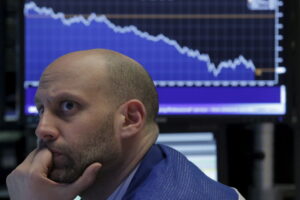Nate Silver charts the course of risk-taking, from Sam Bankman-Fried to Sam Altman
For Nate Silver poker, Sam Bankman-Fried, and the future of AI are all connected by one thing—risk-taking.


Before Sam Bankman-Fried was sentenced to 25 years in federal prison for defrauding customers of his failed crypto exchange FTX, he spent some time with data savant and polling guru Nate Silver.
While Bankman-Fried was preparing for his trial and facing the prospect of decades behind bars, he wasn’t sure he’d take a plea deal, according to Silver’s new book On the Edge: The Art of Risking Everything, which examines risk, starting with Silver’s time as a professional poker player, then the collapse of FTX and eventually to ruminations on whether AI will indeed lead to the end of the world.
For his take on FTX, he conducted a series of previously unreleased interviews with its founder over Zoom, in the Bahamas where Bankman-Fried lived and FTX was headquartered, during a dinner in Manhattan at the three-Michelin-star restaurant Eleven Madison Park, and at his parents’ home in Stanford, Calif., as he prepared for his ill-fated trial. Silver details Bankman-Fried’s risk tolerance and state of mind during those fateful days while also finding him to be reckless and seemingly unaware of the gravity of his actions.
“It’s the combination of being actually not all that great at risk assessment to be euphemistic—I mean terrible at risk assessment—and being willing to gamble it all that was very destructive and having this bizarre cult of personality around him,” Silver told Fortune.
Throughout the book, he shares numerous examples of Bankman-Fried’s unique combination of bluster, delusion, and radical commitment to trying to measure the odds of everything around him that ultimately doomed him.
“The irony is that Sam is actually not a very good calculator of odds,” Silver said in an interview.
Willing to risk everything
Bankman-Fried described his risk tolerance to Silver with the analogy that anyone who doesn’t miss at least one flight is showing up to the airport too early. That mentality led him to overextend himself on some crypto bets at his Alameda Research trading firm. And when they didn’t pan out, he rushed to cover them with FTX customer deposits, precipitating the multibillion-dollar fraud that would land him in jail. FTX collapsed in 2022, but what’s left of the firm agreed to pay $12.7 billion to victims who lost money.
A representative for Bankman-Fried declined to comment.
Bankman-Fried wasn’t able to recognize any possibility that Bitcoin might go down, according to Silver. He “literally [said] ‘hey, if you aren’t willing to risk ruining your life then, you’re a wimp, and you’re doing it wrong,’” Silver added, recalling an interview before the events that would lead to his arrest.
In another interview in the Bahamas in December 2022, after Bankman-Fried had already stepped down as FTX’s CEO and handed the company over to bankruptcy lawyers, he maintained access to the exchange’s live trading records. “This cannot get out right now,” Bankman-Fried told Silver.
A shocked Silver soon realized what Bankman-Fried had in mind: SBF was imagining FTX being turned back on, with him playing some central role in its operations, according to On the Edge.
The ‘River’ vs. the ‘Village’
For Silver, Bankman-Fried was the ultimate risk-taker, a person who was regularly willing to gamble everything for any amount of marginal gains.
That made him the worst version of the type of thinker who makes up “The River,” Silver’s term for analytically-minded people who view the world mostly as a series of probabilistic odds, weighing almost every decision through the lens of a risk-reward and cost-benefit equation.
Most of the River consists of a powerful group of elites, including hedge funders, venture capitalists, startup founders, and professional gamblers. Members of the River, dubbed Riverians, include the likes of Peter Thiel, Marc Andreesen, Bill Ackman, and Elon Musk—analytical, highly competitive, abstract thinkers that have a tendency to be contrarian, according to Silver.
Jockeying for cultural and political power with Riverians is “the Village,” comprised of academics, people working in the media, and government officials who have “distinctly left-of-center-politics associated with the Democratic Party,” Silver writes in his book.
The Village views the River as embodying a type of unrestrained capitalism, while The River believes the Village has let everything be “swallowed by politics,” he said.
Silver, who freely admits he is a member of the River interloping in the Village, points out that neither group is made up of ordinary people. “Both these tribes, the River and the Village, they’re both quite small. They’re elite movements,” he explained. “They’re warring elites over influence—and less so money—mostly influence on American political culture.”
Sam Altman and AI’s risks
For someone with Silver’s obsession with risk-taking, the question of AI represents the pinnacle of cost-benefit analyses. If a Riverian like Bankman-Fried could mess up that badly with a crypto exchange, “think about one with potentially civilization-altering technology like AI in their hands,” Silver wrote.
Proponents say AI could lead to utopia, where poverty is eliminated, mankind finds the cure to every disease, and all work is done by machines, leaving humans to spend their days idly enjoying their time. But skeptics say it could lead to the destruction of human civilization. Silver is not himself a doomer, but neither does he dismiss their concerns.
“To dismiss these concerns is ignorant,” Silver said in On the Edge. “Ignorant of the scientific consensus, ignorant of the parameters of the debate, ignorant and profoundly incurious about mankind’s urge, with no clear exceptions so far in human history, to push technological development to the edge.”
OpenAI CEO Sam Altman said the upsides of AI are too high not to gamble on its risks, according to On the Edge. The naysayers are “people who want to be pessimistic because it makes them cool,” he told Silver.
In the meantime, Altman is “flooring the accelerator,” reportedly looking for $7 trillion in funding for a new venture to build AI chips, and preparing to release OpenAI’s ChatGPT-5 model soon. However, figuring out what exactly Altman might be willing to risk is made more difficult by the River’s tendency to say outlandish things just to get a reaction.
“Asking for $7 trillion that’s another kind of trollish statement,” Silver said. “Actually Sam Altman is very much in that troll camp.”
OpenAI did not respond to a request for comment.
The habit of provoking a response from others found a kindred spirit in at least one other Riverian—Silver himself.
“His tweets I think are actually pretty funny,” Silver said of Altman. “Maybe kind of un-CEO-like, but he’s a poster, which, as a poster myself, I kind of appreciate.”





